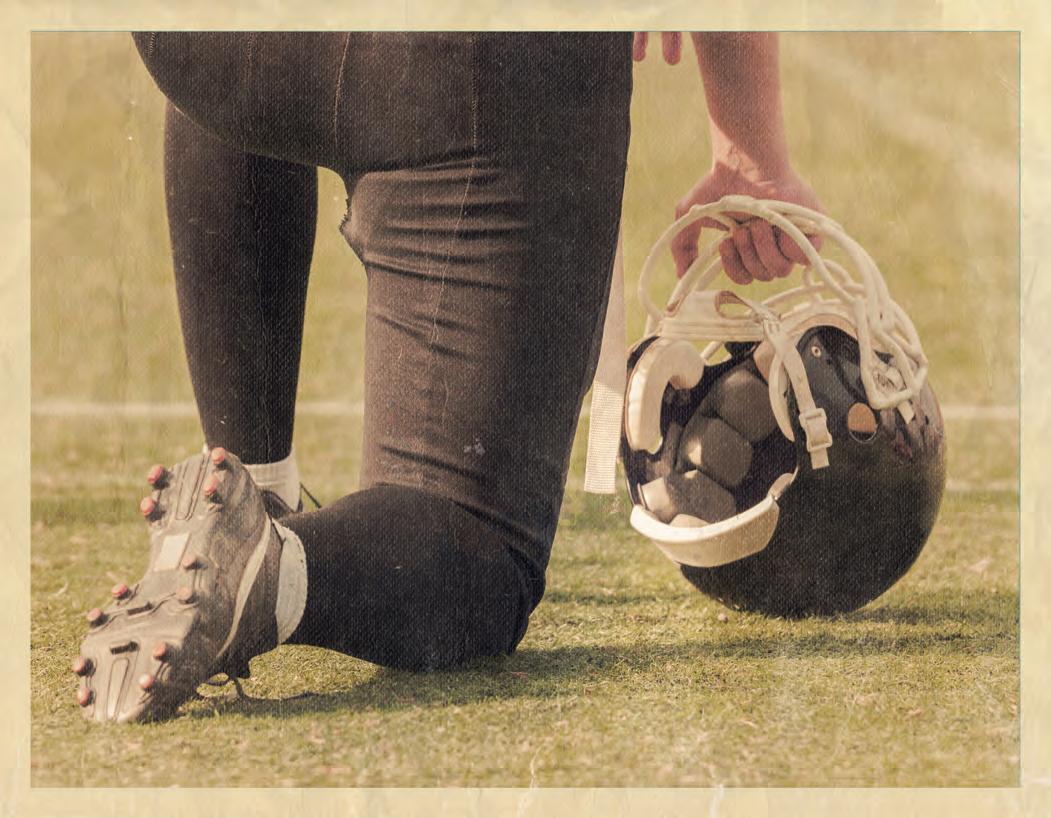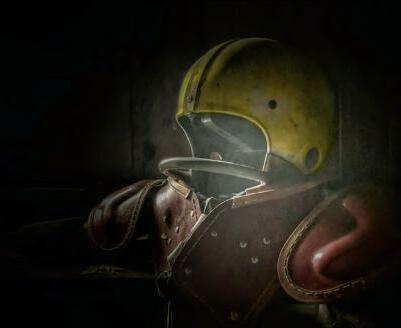
6 minute read
First Person
Recollections of a Turkey Day Rivalry
BY BRION O’CONNOR / PHOTOGRAPHY BY JASON BAKER
Dawn broke bitter cold on November 28, 1968 — Thanksgiving Day — in the Queen City. But the plummeting mercury couldn’t put a dent in my early morning enthusiasm. There was a football game being played at Gill Stadium between Manchester Central High School and Haverhill High School in Massachusetts, and I had every intention of going.
My siblings and I were out-of-towners, all born in New Jersey. However, my mother, Jane A. Pare, was a Manchester native, growing up on Lafayette Street on the city’s West Side before meeting my father in New York City and moving to New Jersey. Her brothers, my Uncle Art and my Uncle Bill, both played football in Manchester. They were tall, rugged, handsome men, great role models throughout my life. However, they didn’t attend Central. Both lettered for the St. Joseph “Giant Killers,” the forerunner of today’s Trinity High School Pioneers. They never took part in the classic Thanksgiving football rivalry between Manchester Central and Haverhill.
My grandparents still lived in Manchester in 1968, having moved to a great little spot on Pickering Street. On Thanksgiving morning that year, their house was saturated with the unique scents of Quebec’s Eastern Townships — bacon, sausage, maple syrup, black coffee. The aroma was so distinctive it could have been used for a Pavlovian experiment. The small ranch house was a beehive of activity, with my four siblings and I scurrying about. But I was the only one interested in the football game.
My maternal grandparents — Grandmère grew up in Derry, and Grandpère emigrated from Canada — knew cold. They were among the original proponents of
the adage, “There’s no bad weather, just bad clothing.” They understood, almost intuitively, that the elements, no matter how harsh, could be countered with proper planning. So my Grandmere set to work wrapping my feet in brown paper from shopping bags.
It was, to be honest, the most memorable moment of my day. “Really, Grammy, do you really think I have to do this?” I asked. “It feels weird.”
“You’ll get use to it,” was Grandmere’s succinct reply. “And you’ll thank me later.”
My Grandpere and my Uncle Art, a Jesuit priest, were up for the game. We bundled up in layers, including long underwear, heavy canvas parkas, woolen hats, and, yes, a few sheets of old shopping bags covering our feet, and made our way to the historic Gill Stadium (one of the oldest brick-and-concrete ballparks in the country). Given my New Jersey roots, I didn’t have a root-ing interest in this Thanksgiving tilt. I just loved football.
At 11, and half Irish, I was enamored with the Fighting Irish of Notre Dame. So, naturally, I was drawn to the sun-dappled golden helmets worn by the Haverhill Hillies. In contrast, the Little Green, resplendent in their all-white uniform trimmed with forest green, looked uncannily like my hometown New York Jets.
My memories, more than 50 years later, are admittedly a bit fuzzy. But I distinctly recall enjoying a hot chocolate, marveling at the thick vapor plumes coming from the players and spectators, and thinking the rock-hard frozen field could not have been any fun to play on. The game, predictably, was a defensive slog.
In the game’s waning moments, with the Hillies nursing a precarious 3-0 lead, Central senior co-captain Steve Schubert broke free and made a brilliant dash to the end zone, followed by a dozen bobbing golden Haverhill helmets. It was a run that would cement Schubert’s legend in Manchester.
Final score: Little Green 6, Haverhill 3.
After Schubert’s heroics, after the game, we drove back to my grandparents’ home for a French Canadien feast that my mom and Grandmere prepared. I remember Grandmere pinching my cheeks, commenting how red they were. My toes never got cold. I thanked her for that.
Schubert would go on to a decorated collegiate career with the University of Massachusetts Minutemen, and played six seasons in the National Football League for the Chicago Bears and New England Patriots. Little did I know, at the time, just what a feat Schubert and his teammates had pulled off.
Manchester first lined up against Haverhill on a football field in 1890, and the rivalry began in earnest in 1896. It was fairly lopsided right from the start. In the first 20 games, Manchester managed to win just twice against the Hillies (short for Hilltoppers), compiling a 2-15-3 mark, including a pair of 0-0 draws. In 13 of those games, Manchester failed to score a single point.
In 1922, the game became Manchester Central versus Haverhill, but the Little Green squad was rarely a match for its opponent. By the time the series ran its course in 1980, the game was one of the oldest Turkey Day tilts in the country. Haverhill was still dominant, ultimately building a 52-18-10 advantage over 80 games (interrupted only by two brief hiatuses, 1910-12 and 1923-28).
I’m not sure any of that mattered to the hardy crowd who came out to watch on Nov. 28, 1968. Looking back on the home team’s victory, I’m sure most of the spectators, at least those who didn’t make the trip from Haverhill, went home happy.
Three years later, my father passed away, a victim of a cigarette habit that he couldn’t shake (the luck of the Irish failed to intervene). His death would prompt my family’s relocation to Manchester, and I became a member of the Manchester Central High Class of 1976. But things didn’t improve much for the Little Green on Thanksgiving Day.
My senior year, the Hillies trounced Central at the old Haverhill Stadium at Riverside Park, 50-7, in a match that was as one-sided as the score indicates (the stadium is situated along the Merrimack River, the same river that divides Manchester to the north). The beat-down was so complete that the Haverhill fans couldn’t even give us, the visitors, a hard time. All my buddies and I could do was laugh, even though we had a few friends playing.
The following year, in the fall of 1976, I became one of the denizens who flocked to the American Legion Sweeney Post No. 2 across Maple Street for cheap beers right after the game. That post-match party with all my high school pals (thanks to the 18-year-old drinking age) was far more fun than the game, which Haverhill won going away, 31-0.
Central grabbed one last brass ring in 1978, managing a 22-21 overtime victory. Before the rivalry’s final game, on November 27, 1980, Haverhill players presented the Little Green with a plaque, marking “90 years of friendship and rivalry.” It was engraved with a simple, heartfelt sentiment: “We bid a sad farewell to good friends and a respected opponent.” Then the Hillies went out and pasted a 25-6 loss on their good friends.
These days, you can still see football played at Gill Stadium on Thanksgiving. Every year, with no “away games” across the border. Initially, all four Manchester high schools had a chance to participate in the Turkey Bowl, which featured the two teams with the best records squaring off. A sort

of city championship, if you will. But only Central and Memorial are still Division 1 schools, with West dropping to Division 2 due to declining enrollment. And Trinity, now Division 3, plays St. Thomas Aquinas High School in Dover on Thanksgiving.
So the original plan, while a reasonable compromise, has gone sideways. And, frankly, it always had a “making the best of a bad situation” feel to it. The format replaced a historic rivalry. Instead, it will be Memorial versus Central this year, and probably for the foreseeable future. But I miss the tradition of the Haverhill-Central games, much like I miss sub-freezing temperatures in late November. Much like I miss my youth. NH
The author would like to acknowledge Haverhill sports historian Ernest V. Young and his son, Michael Young, for their invaluable assistance regarding details of the rivalry.










